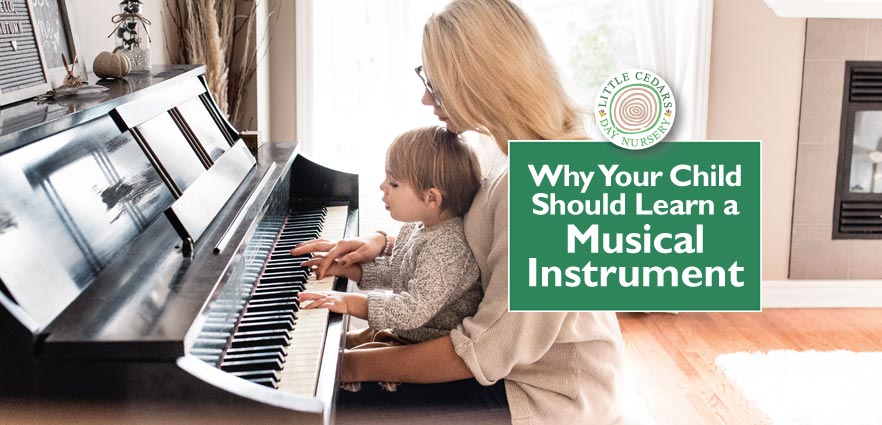
 Both children and adults have a natural affinity with music. It’s one of life’s simple pleasures that just about everyone seems to enjoy in one way or another. Children will naturally start to move, dance, join in or even learn songs that they hear — such reactions seem instinctive to them. Learning to play a musical instrument is therefore a natural next step for them. Indeed, it’s one that parents, guardians and carers should consider encouraging, particularly given how beneficial such an endeavour will be to their child. Learning to play a musical instrument is not simply fun; it profoundly benefits children’s learning and development. With that in mind, we take a look today at the incredible array of benefits that learning a musical instrument poses for children, including under-fives.
Both children and adults have a natural affinity with music. It’s one of life’s simple pleasures that just about everyone seems to enjoy in one way or another. Children will naturally start to move, dance, join in or even learn songs that they hear — such reactions seem instinctive to them. Learning to play a musical instrument is therefore a natural next step for them. Indeed, it’s one that parents, guardians and carers should consider encouraging, particularly given how beneficial such an endeavour will be to their child. Learning to play a musical instrument is not simply fun; it profoundly benefits children’s learning and development. With that in mind, we take a look today at the incredible array of benefits that learning a musical instrument poses for children, including under-fives.
The Benefits of Learning to Play a Musical Instrument
• Enhanced Cognitive Development
As something that stimulates multiple senses and encourages new connections in the brain, learning to play music aids cognitive development and enhances memory skills. Because of this, children who learn to play and read music have been shown to achieve better grades at school and in exams.
“Children who learn to read music achieve better grades at school and in exams.”
• Improved Coordination
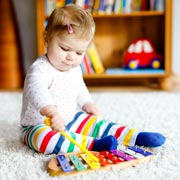 Studies have also shown that learning an instrument or learning how to read music develops the left side of the brain. This area is responsible for processing language and reasoning. Hand-eye coordination skills are also aided when learning to play a musical instrument and reading music. As children’s playing and reading become more advanced, it requires the brain to work at a range of speeds, which is also great exercise for the brain.
Studies have also shown that learning an instrument or learning how to read music develops the left side of the brain. This area is responsible for processing language and reasoning. Hand-eye coordination skills are also aided when learning to play a musical instrument and reading music. As children’s playing and reading become more advanced, it requires the brain to work at a range of speeds, which is also great exercise for the brain.
• Improved Well-being
Music has different effects on mood, depending on the music, style and time signature. It can have a calming effect, for sure, and importantly can be a great stress reliever. Children can ‘lose themselves’, entering a different phase of being when focusing on playing or listening to music. When playing in the background, music can also help to promote concentration, for example if they are working, drawing or being creative.
• Allowing Self-Expression
 Music gives children a really flexible way of expressing themselves. For instance, the way they choose to bang on a drum, shake a tambourine or strum a guitar can allow them to show happiness, anger, frustration, calmness and many other emotions. Playing a musical instrument gives them a real freedom of expression, even at a very young age. Then, if they reach a point where they are able to make up their own melodies and arrangements, music can become an almost immeasurably powerful tool for self-expression and communication.
Music gives children a really flexible way of expressing themselves. For instance, the way they choose to bang on a drum, shake a tambourine or strum a guitar can allow them to show happiness, anger, frustration, calmness and many other emotions. Playing a musical instrument gives them a real freedom of expression, even at a very young age. Then, if they reach a point where they are able to make up their own melodies and arrangements, music can become an almost immeasurably powerful tool for self-expression and communication.
• Encouraging Social Skills & More
Group music sessions are a brilliant way for children to make friends and enhance social skills. Whether collaborating on a piece of music with friends at pre-school, school or outside of nursery/education, it encourages teamwork, cooperation and working towards a common goal. A healthy dose of socialising and fun is all a part of it too. A progression, perhaps, to music clubs will also encourage little ones to mix with children of other ages. In turn, such group music activity can help children become inspired and further encouraged by peers.
“Music in itself is healing. It’s an explosive expression of humanity. It’s something we are all touched by. No matter what culture we’re from, everyone loves music.” — Billy Joel
• Improved Mathematics Skills
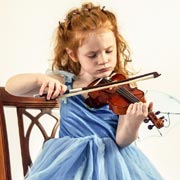 Although playing an instrument is creative, music and maths are very much intertwined. Beats, rhythms and scales are all based on maths and children naturally need to work out some maths in order to understand the song and any sheet music. This will naturally help them to better grasp mathematics and illustrate a real-world example of how it underlies many things.
Although playing an instrument is creative, music and maths are very much intertwined. Beats, rhythms and scales are all based on maths and children naturally need to work out some maths in order to understand the song and any sheet music. This will naturally help them to better grasp mathematics and illustrate a real-world example of how it underlies many things.
• Boosting Reading Skills
Reading music is a whole new skill that children can get to grips with once they’re at a suitable level of cognitive development. The child needs to read and work out which notes to play, how long to hold them, what key is involved, how to read on ahead, follow rhythm and patterns and so on. It’s an amazing skill to accomplish and is an excellent way to boost reading skills as well as cognitive function, hand-eye coordination, self-expression and so much more.
• Better Listening Skills
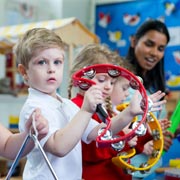 Whether your child is listening to a tutor, teacher, friend or relative, listening skills are very important. Music is a natural way to encourage listening and that’s even more true when children learn to play music themselves. Doing so in their early years will help them to follow instructions, listen out for smaller details as well as the bigger picture. Working together on a piece of music is also a fantastic way to hone group listening skills and teamwork and to encourage collaboration.
Whether your child is listening to a tutor, teacher, friend or relative, listening skills are very important. Music is a natural way to encourage listening and that’s even more true when children learn to play music themselves. Doing so in their early years will help them to follow instructions, listen out for smaller details as well as the bigger picture. Working together on a piece of music is also a fantastic way to hone group listening skills and teamwork and to encourage collaboration.
• Improving Understanding of Culture & History
Music can open up a whole new world to children. It can give them new insights into different countries, different eras, different cultures and different styles. They’ll suddenly become aware, for instance, of rock, blues, jazz, folk etc. and how other cultures use different instruments and styles in their music.
• Supporting the EYFS
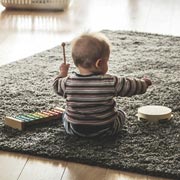 Indeed, music helps to support all 7 focus areas of the Early Years Foundation Stage (EYFS) curriculum. Learning to play and read music helps children improve personal, social and emotional development, physical development (fine motor skills etc.) communication and language, literacy, maths, understanding the world as we saw above and, of course, expressive arts through musical expression and creativity. All these things are at the core of the EYFS. Music is amazingly powerful and impactful in its reach and the bottom line is that it helps children boost grades.
Indeed, music helps to support all 7 focus areas of the Early Years Foundation Stage (EYFS) curriculum. Learning to play and read music helps children improve personal, social and emotional development, physical development (fine motor skills etc.) communication and language, literacy, maths, understanding the world as we saw above and, of course, expressive arts through musical expression and creativity. All these things are at the core of the EYFS. Music is amazingly powerful and impactful in its reach and the bottom line is that it helps children boost grades.
• Boosting Confidence
 When children master a song, no matter how basic, they get an enormous sense of achievement and even more so if they are praised by adults and peers. Such praise also encourages the child to progress further, of course. Boosting self-esteem and self-confidence in their early years is important for their future wellbeing too. Achieving something through learning, patience and practising regularly also teaches them that persistence and effort will help them overcome challenges. That’s a very important lesson in life.
When children master a song, no matter how basic, they get an enormous sense of achievement and even more so if they are praised by adults and peers. Such praise also encourages the child to progress further, of course. Boosting self-esteem and self-confidence in their early years is important for their future wellbeing too. Achieving something through learning, patience and practising regularly also teaches them that persistence and effort will help them overcome challenges. That’s a very important lesson in life.
It’s Never too Early or too Late to Start Playing Music
It’s never too late or too early to start learning a musical instrument. With all the benefits, though, it makes sense to give your little one the wonderful opportunities that playing musical instruments provides as early as possible. It’s easy to start, too. When they’re tiny, you could start them off with simple instruments. For example, they could beat a drum — even a home-made drum, which can be simply an empty box, upturned container or upturned pots and pans, using a wooden spoons as drumsticks. Triangles are simple for infants to ‘ting’ and tambourines are super-easy for toddlers to shake. 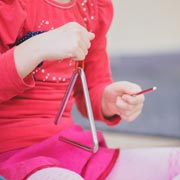 Little ones can first practise keeping in time to music or a beat that an adult is demonstrating, perhaps. Maracas are also good starter instruments although, again, anything that makes a shaking sound can be made at home at zero cost. For instance using an empty carton or plastic container securely sealed with dried rice, pasta or lentils inside. Once they get the hang of such percussive or shaker-style instruments, you can consider transitioning them to more advanced instruments like recorders, ocarinas, keyboards, stringed instruments and so on. Often, children will be more than willing to give such instruments a try and some encouragement and guidance from knowledgeable adults or older children will always be helpful. And, who knows, they could end up being maestros and even stars in the making!
Little ones can first practise keeping in time to music or a beat that an adult is demonstrating, perhaps. Maracas are also good starter instruments although, again, anything that makes a shaking sound can be made at home at zero cost. For instance using an empty carton or plastic container securely sealed with dried rice, pasta or lentils inside. Once they get the hang of such percussive or shaker-style instruments, you can consider transitioning them to more advanced instruments like recorders, ocarinas, keyboards, stringed instruments and so on. Often, children will be more than willing to give such instruments a try and some encouragement and guidance from knowledgeable adults or older children will always be helpful. And, who knows, they could end up being maestros and even stars in the making!
Outstanding Childcare at a Good Nursery in Streatham
Little Cedars (Streatham) is a good nursery/pre-school across all areas, say Ofsted

 Ofsted independently rates Little Cedars Nursery as a good early years provider, scoring high in all areas that they assess. We are a high quality nursery and pre-school in Streatham that gives babies, toddlers and under-5s the very best start in life. By the time they leave us, they’ve achieved personal bests in every area of the curriculum and we aim to ensure they’re ‘school ready’ by the time they leave us at the age of five.
Ofsted independently rates Little Cedars Nursery as a good early years provider, scoring high in all areas that they assess. We are a high quality nursery and pre-school in Streatham that gives babies, toddlers and under-5s the very best start in life. By the time they leave us, they’ve achieved personal bests in every area of the curriculum and we aim to ensure they’re ‘school ready’ by the time they leave us at the age of five.
We’re very near to Streatham Hill, Streatham Park, Streatham Common and Furzedown as well as being conveniently close to Tooting, Tooting Bec, Tooting Broadway, Tooting Common, Balham, Norbury and Colliers Wood. Why not come for a guided tour with your little one — or simply apply for a nursery place for your child. Get started by choosing an appropriate contact button below. We’ll also be happy to answer any questions.

